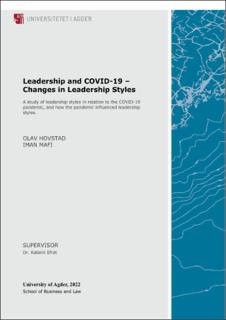Leadership and Covid-19 - Changes in Leadership Styles
Master thesis
Permanent lenke
https://hdl.handle.net/11250/3036467Utgivelsesdato
2022Metadata
Vis full innførselSamlinger
Sammendrag
The focus of this master thesis was to look at how transformational and transactional leaders dealt with the Covid-19 Pandemic. We are looking at how the different styles dealt with the pandemic if there were any changes in styles and how they managed to survive the pandemic. We discuss leadership theory in terms of transformational and transactional leadership, innovation, and crisis management. Theories from these themes are used as a background before going further in the study.
The research method used is causal and a qualitative approach is applied. The qualitative research approach focuses on social reality and is good for situational research such as the pandemic. We interviewed eight leaders from businesses in the southern region of Norway. The study includes participants from many different lines of business as we wanted to explore how the pandemic was handled by businesses that did well and those who struggled. The types of businesses include a restaurant, a hotel, an online store, and a bank as examples of the variety.
The results from the study make it hard to determine how the different leadership styles dealt with the pandemic as the most evidence pointed toward the respondents being transformational leaders. As we discuss through Hofstede’s dimensions, the Norwegian cultural traits are more in line with those of transformational leaders than transactional leaders. Further, innovation was an important aspect for the businesses to survive, and all the businesses in the study had some sort of innovation through the pandemic. Generally, a transformational leadership style is good for innovation within the organization, and the evidence from our study supports this.
